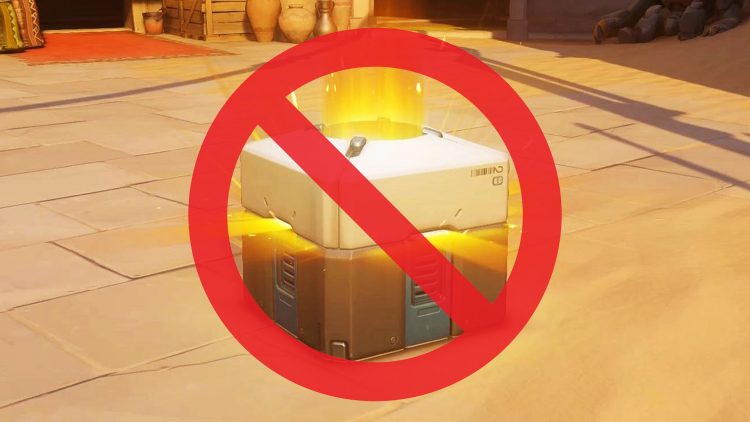On April 25th 2018, Belgium’s legislators officially declared loot boxes in video games, such as those found in games like FIFA, Overwatch and CS:GO (3 of the games investigated), illegal under the countries gambling laws following a study conducted over several months by the Belgian Gaming Commission. The punishment for breaking these laws? A maximum sentence of five years in prison for the publishers, and a fine of up to €800,000 (approximately £700,000 or US$970,000). The sentence can be doubled if minors are involved, potentially problematic for games like FIFA and Overwatch, which are rated PEGI 3 and PEGI 12 respectively.
The announcement comes shortly after the Netherlands, one of Belgium’s geographical neighbours, ruled that games that include loot boxes containing items with market value were in violation of the counties “Betting and Gaming Act” after also conducting research into several popular games. The Dutch Gaming Authority did not specifically name any games, but the Dutch Broadcast Foundation (known as the Nederlandse Omroep Stichting in Dutch) named the games to be FIFA 18, Dota 2, PUBG and Rocket League.
The Minister of Justice, Koen Geens said loot boxes in video games were “a danger to mental health”. Minister Geens full statement, translated to English by Steam user and friend Kippenoma, will be at the end of this article, as well as a link to Koen Geens’ website with the full press release.
In 2017, EA’s Star Wars: Battlefront II was on the – wait for it – battlefront of the war against loot boxes, but EA temporarily removed all microtransactions following severe backlash on social media, including a comment on Reddit which became the most downvoted comment of all time. Despite this, Battlefront II wasn’t technically breaking any laws because the ability to buy loot boxes using real money has been removed from the game, so it is no longer “a game of chance”. According to the press release from Koen Geens, Battlefront II, and the media coverage that followed it, actually inspired the study after Geens found himself concerned about the effect of such a game element on young and vulnerable players.
Geens has not currently given a deadline for when these game elements need to be amended, but EA, developer and publisher of the FIFA series, says neither Geens or the BGC have been in contact directly since Geens’ invitation to discussion, but “welcome a dialogue with minister Geens.” EA claims none of its games contain elements of gambling or break any laws. An EA spokesperson told GamesIndustry.biz, they “strongly believe that [their] games are developed and implemented ethically and lawfully around the world”, adding that they “care deeply that [their] players are having a fun and fair experience in all of [their] games”.
The BGC tested for certain criteria to determine if specific games broke their laws. If there is a game element involving random chance that could lead to a profit or a loss following a players bet, then the game element violates the Betting and Gaming Act, making the game element illegal under Belgian legislation.
The statement has received enormous praise online, rising to the top of /r/News with almost 100,000 upvotes on Reddit, and some see the move as a reason for hope in Europe as more countries may look to follow Belgium in the near future.
The UK conducted a similar study in March 2017, but concluded that rewards from loot boxes were “prizes” and as long as they couldn’t be traded outside of the game, they held no market value and thus did not constitute licensable gambling. The report compared items that could be traded to casino chips which hold no value on their own but can be exchanged for cash. In August 2017, the UK’s Gambling Commission opened an investigation into skin gambling, but concluded again that they could not outlaw loot boxes unless Parliament changed the law, but said they would try to raise awareness of the dangers of loot boxes with children and parents. In October 2017, the Gambling Commission said they would “keep this matter under review” and would “continue to monitor developments in the market”.
The US has taken a similar stance, with little action against loot boxes. In April 2018, Minnesota issued a bill containing the clause:
Loot boxes; prohibition; warning required. (a) No retailer may sell to a person under 18 years of age a video game containing a system that permits the in-game purchase of (1) a randomized reward or rewards, or (2) a virtual item that can be redeemed to directly or indirectly receive a randomized reward or rewards.
The bill states that no games containing loot boxes that can be bought with real money can be sold to minors. That included indirect purchases through in-game currency.
Are rulings like these a step in the right direction for gaming, or could it just lead developers to stop selling their games in certain regions? What could it mean for loot boxes and the rest of the industry if laws like these became widespread? I think this is a great step in the right direction, and even if it means companies only have to buy a license to keep their loot boxes, another hole to jump through should help discourage implementation in future games. In the words of Reddit user /u/CCCmonster, Belgium should have a sense of pride and accomplishment for this one.
Minister Geens full statement:
“Mixing games of chance/gambling and video games, especially at a young age, is a danger to mental health. We have named several measures to protect both the underaged and adults from the influence of, among other things, gambling adverts. That’s why we have to make sure that children and adults aren’t confronted with games of chance when they seek enjoyment/pleasure in a video game.” -Translated by Steam user and friend Kippenoma
Read more here: https://www.koengeens.be/news/2018/04/25/loot-boxen-in-drie-videogames-in-strijd-met-kansspelwetgeving







